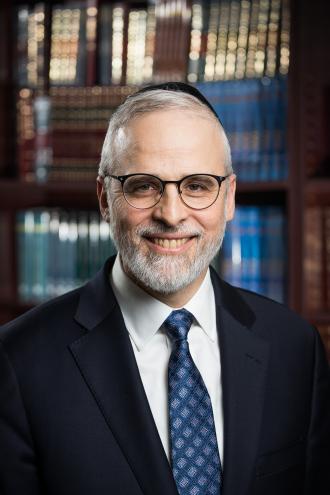In the holiest room on earth, the Holy of Holies, on top of one of the holiest objects in existence, the holy Ark, stood two figures - the “Keruvim”. The Keruvim were two figures carved out of solid gold, each with the appearance of a human face and wings that stretched heavenwards. The Gemara explains that one symbolized the Jewish nation and the other symbolized Hashem Himself.
One would imagine that Hashem would be represented by perhaps a cloud, similar to the Clouds of Glory, or perhaps a fire, similar to when He first appeared to Moshe at the burning bush. Instead, Hashem chose a Human face in order to teach us that we are made in HIS image. In other words, Hashem didn't choose to give Himself a mundane appearance. Rather, the Keruvim were a reminder to us that Hashem, in a sense, gave us a G-dly one*. Hashem felt that the fact that He fashioned us in His image is extremely important for us to be aware of (as stated in Pirkei Avos). In fact, Hashem felt that this message was so important, that He decided to display this fact specifically in the Kodesh HaKadashim, the holiest place on earth, atop of the Ark, the holiest object in existence
Why is our understanding the fact that we were made in Hashem's image SO important? Does this information really have any impact on us?
Thomas Alva Edison is one of history’s greatest inventors. He developed many devices that greatly influenced life around the world, including the record player, the motion picture camera, and the long-lasting, practical, electric light bulb. In fact, he held 1,093 patents in his name just in the USA alone, as well as many more in other countries as well.
When Thomas Edison was a young child, he once came home from school holding a note from his teacher in his hand. He said to his mother worriedly “my teacher gave it to me. What does it say?”. His mother read the note, looked into his eyes, and said with a proud smile: “it says ‘Thomas Alva Edison is a brilliant genius. Our school is not gifted enough to teach him. We recommend that you home-school him instead, to best tap into his full potential’”.
Decades later, after his mother passed away, Thomas Edison was going through her storage attic when he happened upon the very note that he had brought back from school to his mother years earlier. What he saw shocked him. The note read: "Thomas Edison is a complete imbecile. He will never amount to anything. He is expelled from our school!”. Thomas paused for a few moments, took out his private diary and wrote “My mother was an incredibly special and clever woman. By telling her son that he is capable, she took 'an imbecile' and single-handedly transformed him into one of history’s greatest inventors”.
The way to bring out the best out of somebody is to make them aware of just how capable they are. Of equal importance, the way to bring the best out of ourselves is to consciously remind ourselves of just how capable we are. Hashem specifically chose the the holiest place on the planet to display that we are made in His image, in order for us to remember with absolutely certainty that we are no ordinary beings. Rather, we are capable for true greatness as indeed we were made in Hashem's image. If one consciously took this fact to heart, it should make accomplishing greatness that much more attainable.
Living Inspired
The Jews complained multiple times in the desert. They complained when they were hungry, they complained when they were thirsty, and they even questioned "Is Hashem in our midst or not?" ((17:8).
R' Shamshon Raphael Hirsch asks how it was possible for the Jews to doubt Hashem? These were the same people who watched the 10 plagues, witnessed the splitting of the sea, ate the Mun, and drank the water that came from a rock. After all of these incredible experiences, how could they STILL doubt Hashem???
R' Shamshon Raphael Hirsch explains that the reason why the Jewish nation complained so much in the desert is because they struggled with believing that their comfort and needs were truly important enough to the Creator of the Heavens and Earth to notice or care about.
For why would such a powerful Hashem really care about our earthly needs, desires, peace of mind or happiness? This is illustrated by the fact that on each occasion that they complained, the Torah attest that the Jews complained to MOSHE, but not to Hashem. This was the result of them feeling that only Moshe could relate to and care about their suffering, while Hashem did not care to notice such trivial matters (17:7). The Keruvim were intended to dispel this terribly erroneous notion. Hashem imprinted on us a G-dly appearance in order to convey to us that a human being is the most spiritually capable and important creature in all of existence! It is no wonder, then, that He cares about our every need and desire.
At times, we too may be skeptical of the fact that we are incredibly important to Hashem and valuable enough to deserve His unwavering attention. We may wonder whether He cares about our needs, desires, and happiness and whether He cares to be involved with even the smallest details of our lives. This outlook is mistaken and severely off course and the Keruvim are an eternal reminder of this.
So, the next time you need something, talk directly to Hashem. He very much cares to hear from you and to be involved in every single aspect of your life. After all, you are His most prized possession. Equipped with this knowledge, how could we not live more successful lives?
________________
- This week’s Dvar Torah was inspired by an insight from my father.
*- As the Torah states, man was fashioned in G-d’s image (Bereishis 9:6; Devarim 21:23 - see Rashi).















